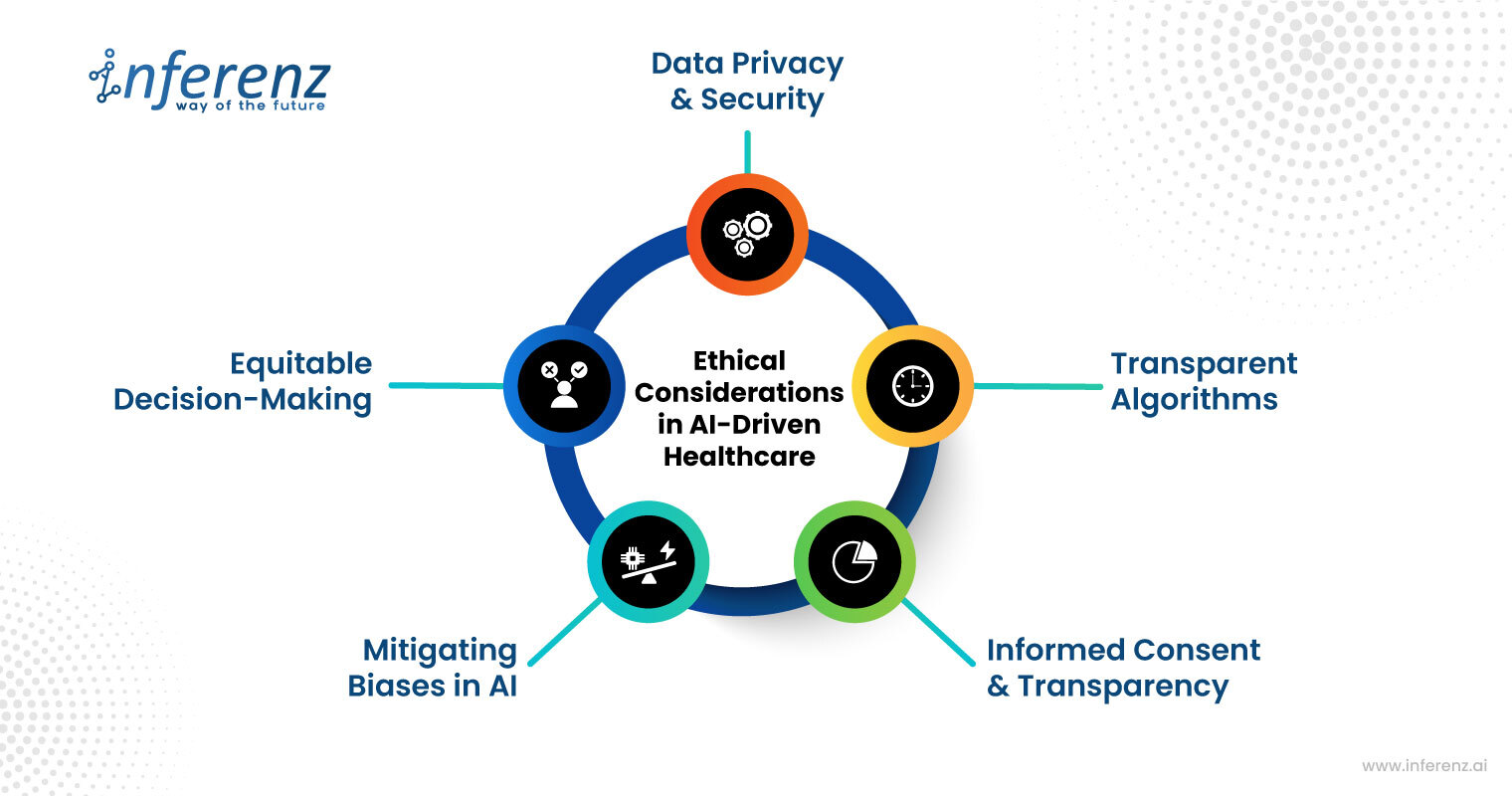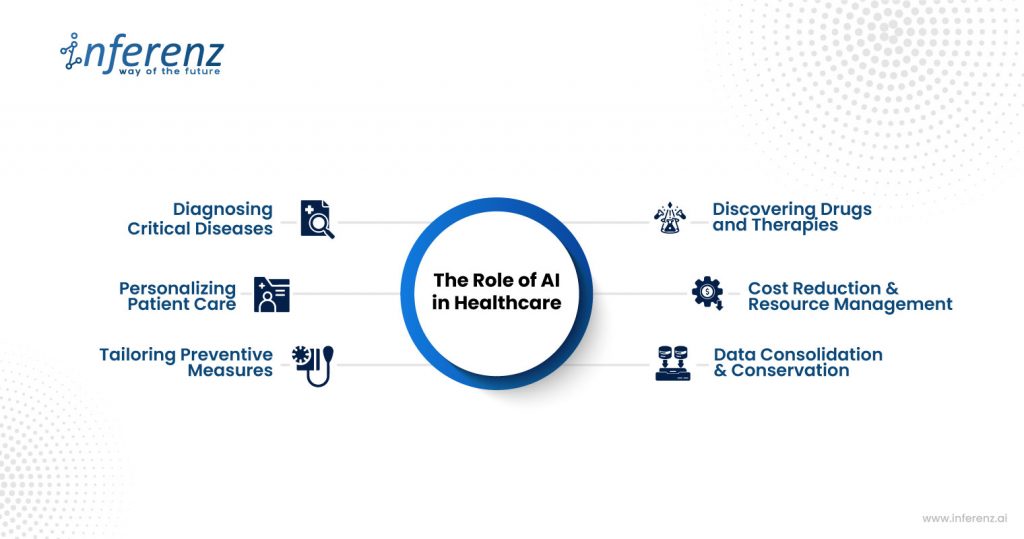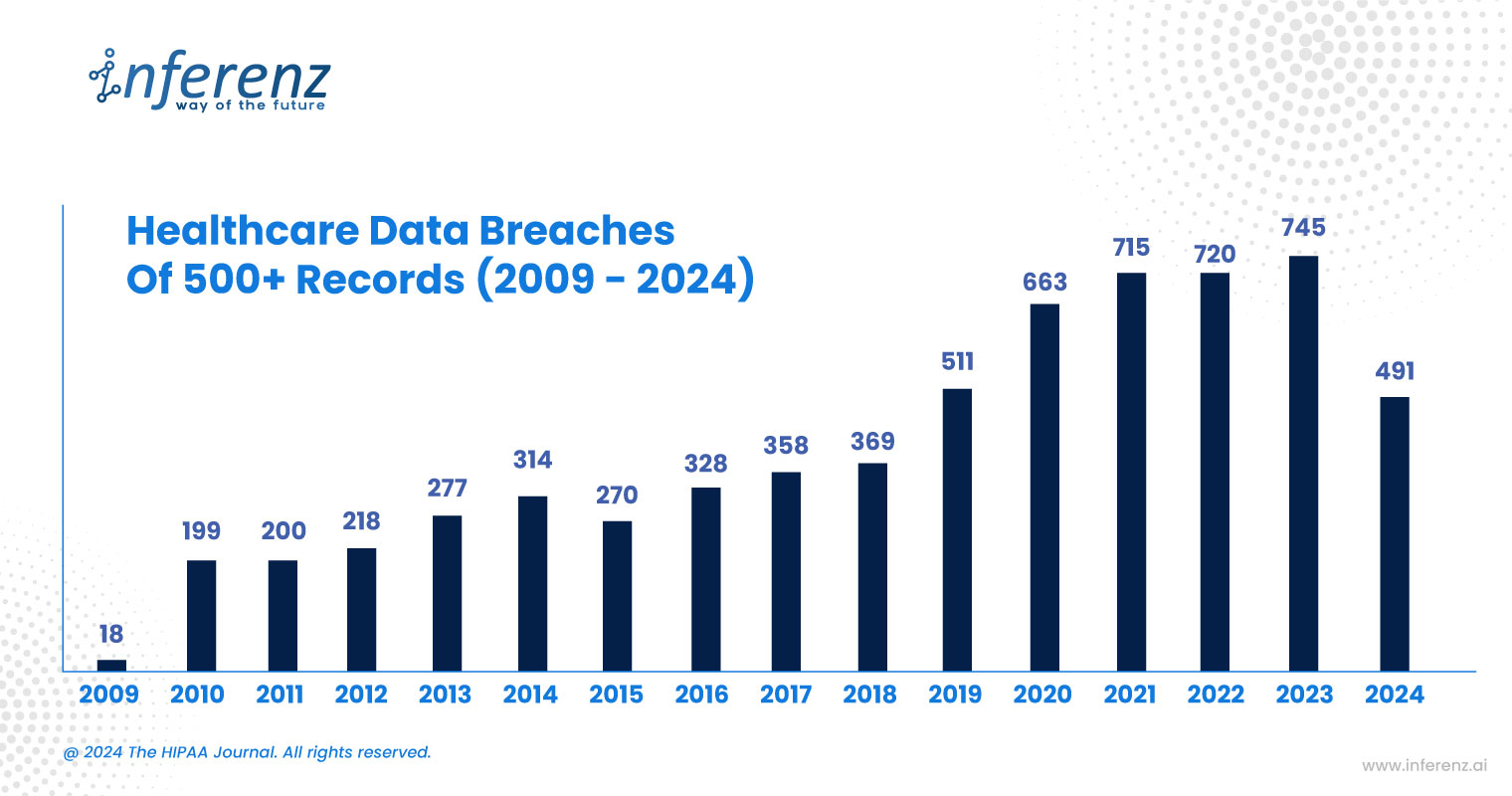AI in healthcare is no longer a glimpse into the future but a breakthrough that is happening today. Its role is extremely conspicuous and has brought about a considerable change to many aspects of healthcare.
From diagnosing diseases with speed and precision, personalizing patient care, tailoring preventive measures, discovering drugs and therapies, and cost reduction to overseeing administrative workflow, the benefits are far-reaching. By consolidating and conserving data, predicting analytics, and natural language processing, AI has optimized healthcare data.
Considering the upheaval brought by AI technology in healthcare, evaluating its usage is crucial, as unregulated AI can endanger patient safety and compromise trust in healthcare. Through this article, we will explore the critical role of responsible AI technology and how it is attainable.
Ethical Considerations in AI-Driven Healthcare
Ethics in AI-driven healthcare is critical as its role in healthcare is one of a silent partner. It impacts the three fundamentals of the industry, which are products, services, and finance. Therefore, rightness in data privacy and security, patient autonomy, roles of stakeholders should be secured. Here are a few examples of ethical considerations in AI-driven healthcare:
Data Privacy & Security
As the volume of healthcare data is growing exponentially, data privacy and security have become primary concerns. Here are a few ways to ensure data privacy and security in healthcare:
Handling Sensitive Patient Data:
As the orientation of the healthcare industry is toward patients, ensuring their data confidentiality is crucial to it. The industry is faced with a wide spectrum of structured, unstructured, and patient-generated health data that necessitates the use of artificial intelligence to process large data sets.
However, its unmonitored use can anonymize patient information. To mitigate that, healthcare organizations must have stringent compliance with security regulations like HIPAA and GDPR and ensure broadened protection of patients’ sensitive medical data.
Risk Of Data Breaches and The Need For Robust Security Protocols:
The HIPPA journal’s healthcare data breach statistics have shown an upward trend in data breaches due to hacking incidents and ransomware attacks. In a record stated by OCR, there was a 239% increase in hacking-related data breaches between January 1, 2018, and September 30, 2023, and a 278% increase in ransomware attacks over the same period.
In 2023, 79.7% of data breaches were due to hacking incidents. Such breaches of healthcare data can be averted through widespread data encryption, the use of intrusion and malware detection systems, and strict security audit protocols.
Bias in AI Algorithms
In healthcare generally, biases in AI can emerge from inherent design or learning mechanisms of the algorithm itself. A study published in the Science Journal described how biases in AI algorithms systematically discriminated based on gender, race, and socioeconomic parameters. Here are a few ways to overcome the prejudice in patient care:
Identifying and Mitigating Biases in Healthcare AI
Healthcare has struggled to include women and minorities in research despite knowing they have different risk factors and manifestations of the disease. Also, the algorithm assigned people to high-risk groups based on their socioeconomic status. According to biases, black people had to be sicker than white people before being referred for additional help.
 The bias in the algorithms that lead to inequities in healthcare can be identified and mitigated by capturing data from varied demography, collaborative research, continuous monitoring, and ensuring accurate and formatted data for use in multiple systems.
The bias in the algorithms that lead to inequities in healthcare can be identified and mitigated by capturing data from varied demography, collaborative research, continuous monitoring, and ensuring accurate and formatted data for use in multiple systems.
Importance of Transparent Algorithms for Equitable Decision-Making:
To ensure transparency in algorithms and support equitable decision-making, the design and implementation of AI algorithms must align with ethical guidelines and industry standards.
The performance of algorithms must be continuously evaluated to ensure transparency and accountability. There should be mechanisms that regularly audit the AI systems to provide accuracy.
Patient Consent & Transparency
The role of AI technology in healthcare must complement patient care and not compete with it. The AI decisions must be regularly scrutinized to identify any potential inaccuracy in the judgment.
The outcomes must be explained to the patients using explainable AI (XAI) to ensure transparency throughout their treatment. Also, healthcare industries must allow insights and data collection from diverse patients to understand the impact of AI on them and mitigate disparities in their care.
Fair Use of AI in Healthcare Analytics and Decision-Making
Fair use of AI in healthcare means the use of unbiased AI that supports patient autonomy and provides accurate diagnoses and treatments for all patients regardless of their differences. Establishing this fairness requires an understanding of the potential causes of misuse of AI and the development of strategies to mitigate them.
AI in Diagnostics and Treatment Planning
The integration of AI in healthcare offers precision in diagnosis and effective treatment plans. With algorithms, AI can identify anomalies in medical data and offer evidence-based recommendations and insights. It can help monitor patient conditions and provide personalized treatment, thus improving overall patient care.
Ensuring AI Recommendations Align With Human Clinical Judgment
Healthcare is human-centered, making it imperative that AI recommendations harmonize with human intelligence for enhanced clinical judgments. While AI can process large data sets and provide predictive analysis, it lacks the nuanced judgment and ethical reasoning of humans.
The healthcare industry must have a collaborative human-in-the-loop model where AI is used as a tool to increase diagnostic accuracy, provide remote health monitoring and personalized treatment, and streamline administrative workflow.
Avoiding Over-reliance on AI
AI has the potential for misinformation, algorithmic bias, and lack of accountability that can endanger patient safety. Therefore, it is important to avoid over-reliance on AI, maintain human oversight to mitigate biases, and explore key ethical concerns, including patient data privacy, security, and discrimination.
By avoiding over-reliance on AI and integrating human oversight, we can ensure that AI technologies align with healthcare values and ethical standards, thereby fostering patient’s trust in healthcare systems.
AI in Predictive Analytics
AI predictive analytics uses machine learning (ML) algorithms to assess how different diseases progress in individual patients and predict how they might respond to various treatments. This leads to more personalized treatment plans, maximizing effectiveness in healthcare management.
Responsible Use Of AI In Predicting Patient Outcomes
In the context of preventative care and personalized medicine, AI can be used responsibly to process broader medical data, including genetic data, medical history, and lifestyle factors, to identify patterns and make predictions about health outcomes. It can forecast public health risks, provide personalized risk assessments, and support decision-making in preventive medicine.
Ethical Implications Of Using Predictive Data In Patient Care Decisions
Although AI is a potentially promising application, the ethical implications of using patient data raise concerns about patients’ autonomy in decision-making that could impact the doctor-patient relationship.
As over-reliance on predictive analytics grows, aspects like voluntary participation, informed consent, confidentiality, etc., must be necessitated. It’s crucial to strike a balance between taking advantage of the benefits and safeguarding the patient’s confidential data against misuse.
Regulatory Landscape and Future Outlook
AI technologies are being rapidly deployed, which could either benefit or harm stakeholders, including healthcare professionals and patients. When using health data, AI systems could have access to sensitive personal information, necessitating robust legal and regulatory frameworks for safeguarding privacy, security, and integrity.
Current AI Regulations in Healthcare
The World Health Organization (WHO) has listed key regulatory considerations on the role of AI in healthcare. WHO emphasizes the following aspects in its listing:
- Ensure accurate data quality through rigorous evaluations and prevent biases and errors in the AI algorithms.
- Address risk management, issues like ‘intended use,’ ‘continuous learning,‘ human interventions, training models, and cybersecurity threats.
- Externally validate data and interpret the intended use of AI to assure safety and facilitate regulation.
- Encourage dialogue and collaboration among stakeholders, including healthcare developers, regulators, manufacturers, health workers, and patients.
- Foster trust and transparency in documentation by documenting the entire product lifecycle and tracking development processes.
Future Trends in Responsible AI Governance
The future of AI in healthcare is brimming with promises as it is expected to enhance the functionality of healthcare systems further and positively impact patient care. According to the Mayo Clinic, the future of AI in healthcare could create novel methods to diagnose, treat, predict, prevent, and cure disease. It can select and match patients with the most promising clinical trials and develop remote health-monitoring devices and more. Here are a few areas of development:
- Adaptive Learning & Real-Time Data Analysis: The future of AI in healthcare will be more equipped with advanced learning capabilities and analyzing data in real-time. It will constantly update its knowledge base and algorithms with new data, research, and outcomes.
- Adaptive Patient Care: Continuous learning will enable AI to assess patient-specific factors over time better, leading to more personalised and effective healthcare solutions.
- Accuracy Over the Long Run: As AI gains more exposure to diverse patient cases and conditions, its diagnostic and treatment recommendations are expected to become precise and reliable.
FDA has developed SaMD (Software as a Medical Device) that necessitates the steps AI models must follow to be approved for healthcare. AI developers have to seek review and approval from the FDA when significant medication is involved.
Here are a few more ways to ensure that the future of AI in healthcare is made with greater responsibility:
- Maintain algorithmic accountability by building a framework that ensures that AI systems are audited and held accountable for their outcomes.
- Develop a human-in-the-loop (HITL) model where human judgment is blended with AI technical know-how.
- Mobilize Fast Healthcare Interoperability Resources (FHIR), a health level seven international (HL7) standard for exchanging healthcare information electronically.
- Execute a federal learning approach to train AI models using data from healthcare institutions without sharing sensitive data, ensuring patient privacy while still improving the model’s performance.
Inferenz is a team of skilled professionals that offers healthcare professionals cutting-edge solutions and products. We provide tailor-made machine learning and AI chatbots for healthcare to ensure they align with your business needs.
Contact us today, and let us help you build the right solution that seamlessly fits into the existing system.
AI in Healthcare FAQs
What is the future of AI in healthcare?
The future of AI in healthcare includes tasks ranging from simple to complex—everything from reading radiology images to making clinical diagnoses and treatment plans and providing preventive healthcare measures.
What is the most common use of AI in healthcare?
One of the most common uses of AI in healthcare is training algorithms using data sets such as health records to create models capable of performing tasks like predicting and categorizing outcomes.
How to improve healthcare using AI?
AI can improve healthcare in many ways, including medical diagnosis, drug discovery, patient safety and experience, and healthcare data management. While AI has many benefits in healthcare, patient education and building trust are also crucial for successful integration.
What are the ethical considerations in AI healthcare?
Some ethical considerations in healthcare include addressing the biases in AI algorithms, ensuring data privacy, asking for patient consent, and maintaining complete transparency in the decisions.
How does AI reduce costs in healthcare?
AI can process a vast amount of medical data to identify patterns that improve decision-making and offer more cost-effective treatments. It can also automate certain administrative tasks that reduce patients’ workloads and improve job satisfaction.















